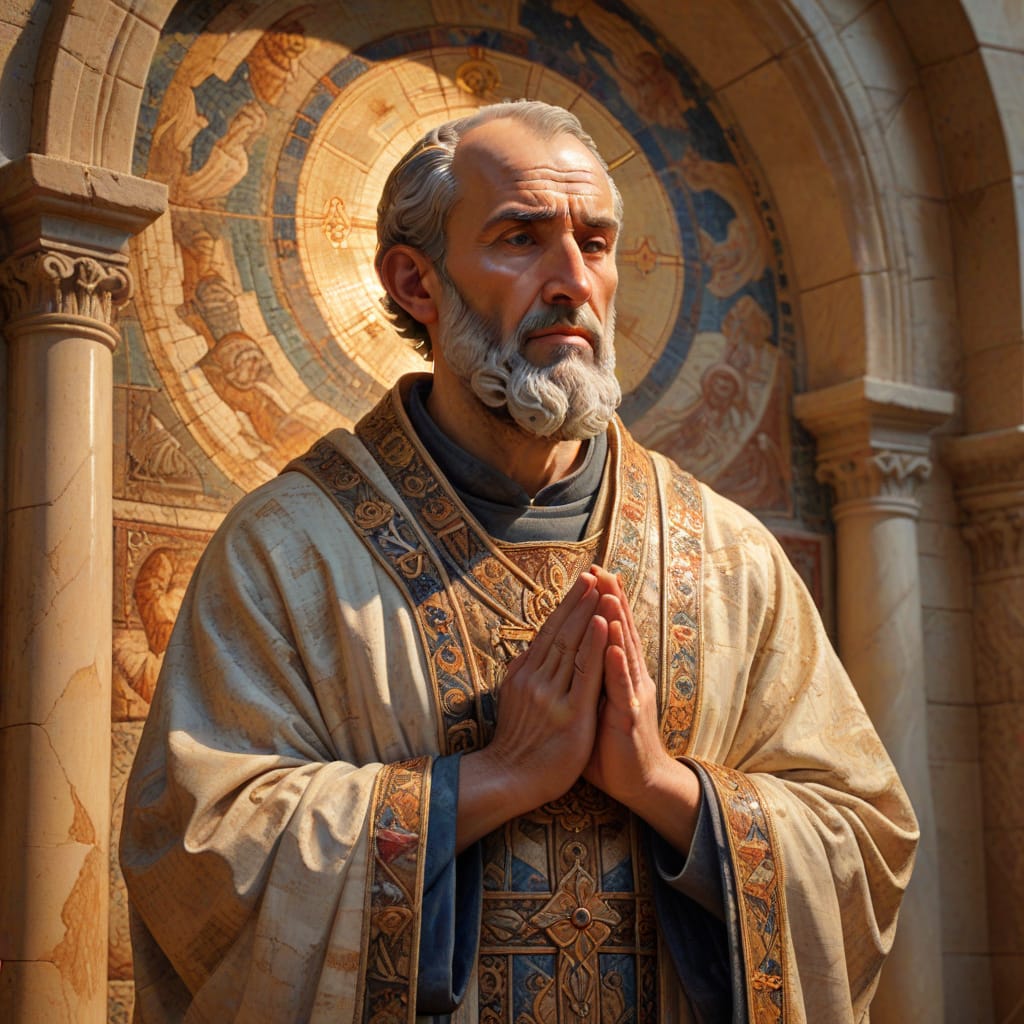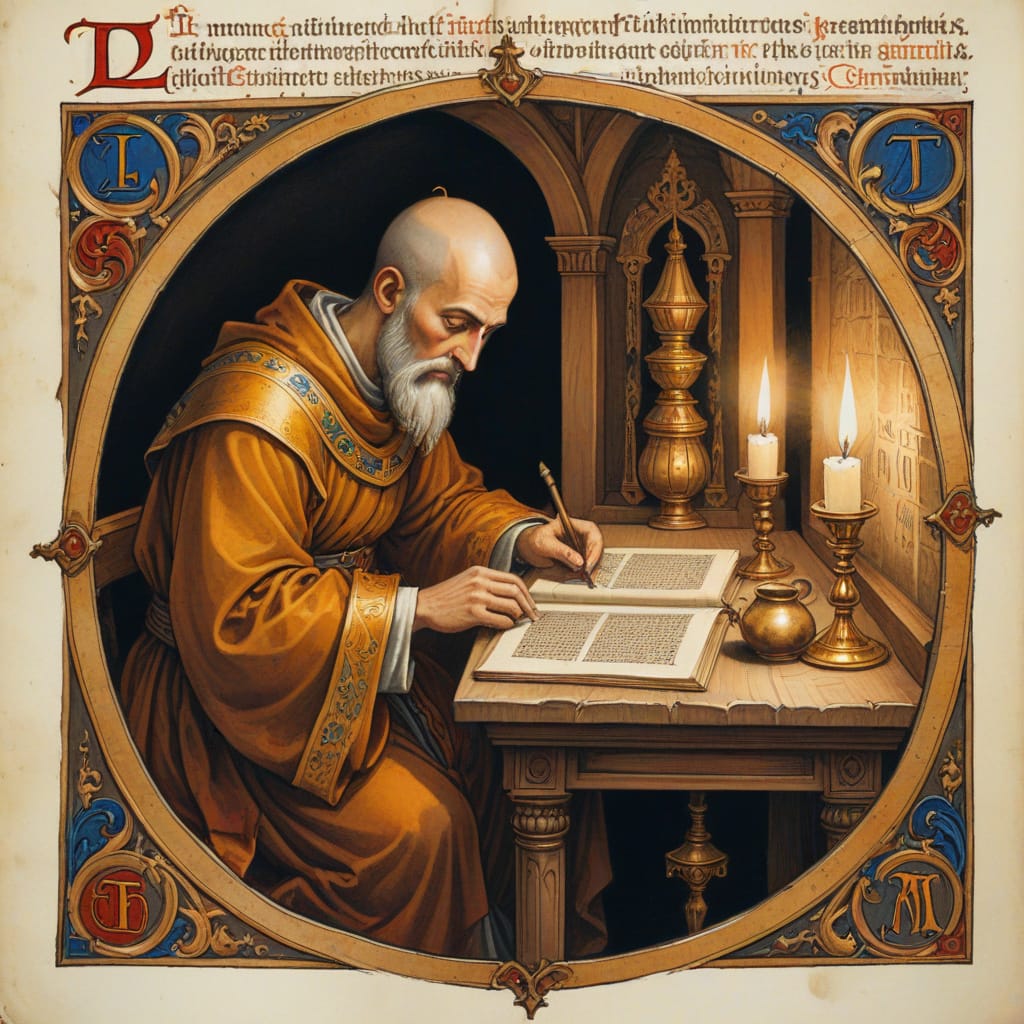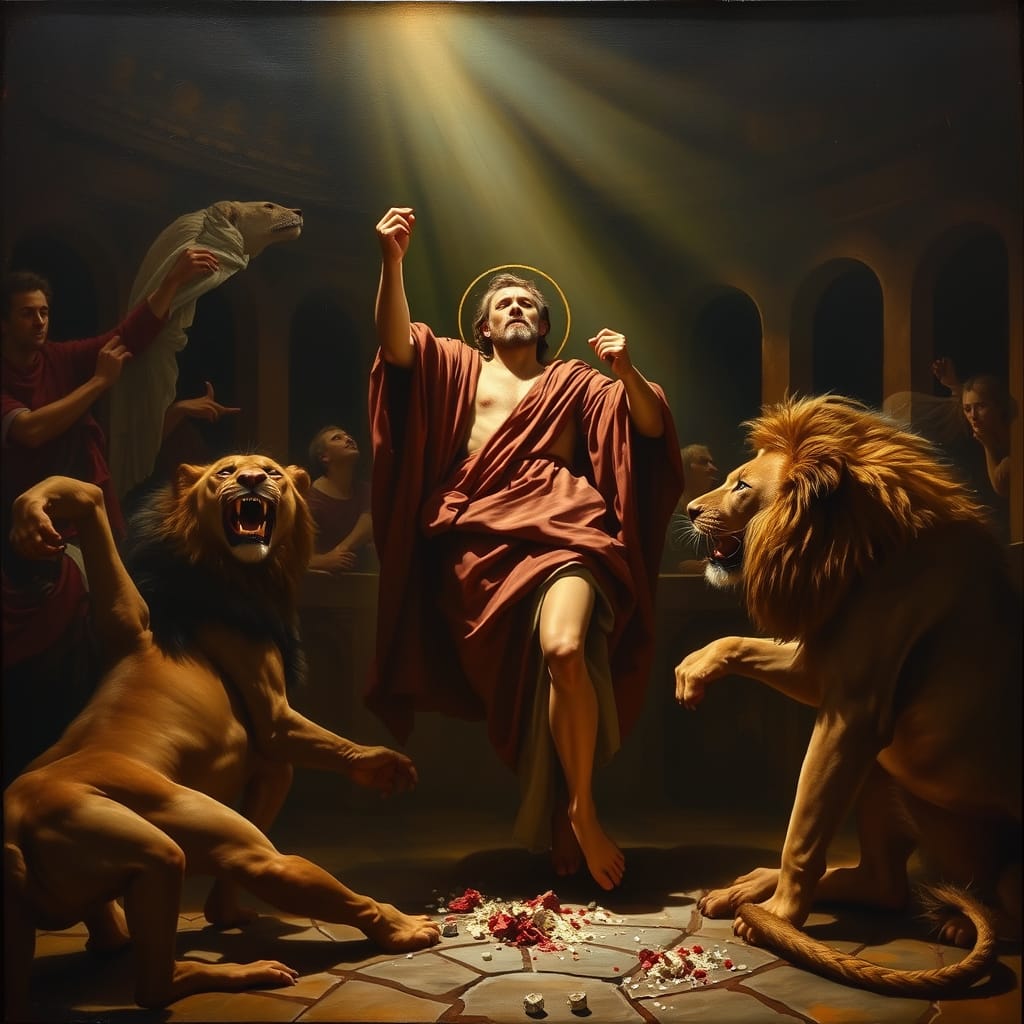
Ignatius of Antioch
Ignatius of Antioch (also known as Theophorus, meaning “God-bearer” in Greek), circa 35–110 CE, served as the bishop of Antioch. It is possible that he had direct acquaintance with the Apostle John, and his theological perspectives are undoubtedly influenced by the tradition associated with him.

Information regarding Ignatius’s life is primarily derived from his personal correspondence and subsequent historical accounts. It is believed that Ignatius converted to Christianity at a young age. Historical tradition associates him and his contemporary Polycarp as disciples of John the Apostle.

Later in his life, Ignatius was appointed as Bishop of Antioch; according to the fourth-century Church historian Eusebius, he succeeded Evodius in this role. Theodoret of Cyrrhus also asserted that Saint Peter personally entrusted Ignatius with this episcopal position. Ignatius was also known by the title Theophorus, meaning “God Bearer.” Some traditions hold that he was among the children whom Jesus Christ blessed during his ministry.

During his journey to martyrdom in Rome, Ignatius authored a series of letters that have been preserved and are considered significant early Christian theological writings.

English translations of these works can be found online in the Ante-Nicene Fathers series on the Christian Classics Ethereal Library website.

Style and Composition
The writings of Ignatius show evidence of being composed under time constraints, characterized by lengthy sentences and a somewhat unorganized flow of ideas. These epistles are modeled after the biblical letters of apostles such as Paul, Peter, and John, often citing or paraphrasing their writings. For instance, in his letter to the Ephesians, Ignatius references 1 Corinthians 1:18:
“Let my spirit be considered as nothing for the sake of the cross, which is a stumbling block to those who do not believe, but to us, it is salvation and eternal life.”
— From the Letter to the Ephesians, as translated by Roberts and Donaldson
The Martyrdom of Ignatius of Antioch

The martyrdom of Ignatius of Antioch, bishop of Antioch, took place approximately between 110 and 120 AD, when he was condemned to death for his Christian beliefs under Emperor Trajan. He was transported to Rome, where he faced execution in the Colosseum. Ignatius viewed this sacrifice as a profound act of faith and an emulation of Christ’s suffering. During his journey, he authored several important letters to various Christian communities, emphasizing the importance of unity and steadfastness in faith. His martyrdom remains a significant testament to his devotion and conviction.
The Condemnation and Journey:
Arrest and Sentencing: Ignatius was arrested in Antioch, for refusing to worship Roman gods, and sentenced to death by Emperor Trajan.
To Rome: He was transported to Rome by a band of soldiers to face execution.
The Journey’s Significance: The journey itself became a crucial part of his story, as he met with churches and wrote his famous letters to encourage and teach them.
Ignatius’s Letters:
- Content: His seven surviving letters offer insights into the early Christian Church, discussing matters of doctrine, the importance of bishops, and the dangers of heretical teachings.
To the Romans:
In his final letter, he famously pleaded with the Christians in Rome not to try to save him, desiring to be martyred for Christ.
The Martyrdom
- The Method: Ignatius was thrown to the wild beasts in the Roman Colosseum, as was the custom for condemned criminals.
His Enthusiasm:
He viewed this death as the highest honor, seeing it as the way to become “God’s wheat” and to participate in Christ’s sufferings and resurrection.
Legacy:The martyrdom of Ignatius of Antioch, the bishop of Antioch, took place approximately between 110 and 120 AD, when he was sentenced to death due to his Christian faith under the reign of Emperor Trajan. He was transported to Rome, where he faced execution. Ignatius viewed his impending death as an honorable act and a meaningful way to exemplify Christ’s suffering. During his journey, he authored several important letters to different Christian communities, emphasizing the importance of unity and steadfastness in faith. His martyrdom stands as a significant testament to his unwavering commitment to his beliefs.
His martyrdom was a powerful testament to his faith, and his remains were eventually conveyed back to Antioch as a treasure for the church
Theology and Christology
Ignatius is recognized for his teachings regarding the divine nature of Jesus Christ:
There exists One Physician, who possesses both flesh and spirit; who is both created and uncreated; God incarnate in human form; the source of true life through death; both of Mary and of God; initially susceptible to suffering and subsequently impervious, even Jesus Christ our Lord.— Letter to the Ephesians, Chapter 7, abbreviated version, Roberts-Donaldson translation
In the longer recension, this passage is presented as follows:
Our Physician is the one true God, the unbegotten and incomparable, the Sovereign of all, the Father and originator of the only-begotten Son. We also recognize as our Physician the Lord our God, Jesus the Christ—His only-begotten Son and Word—who existed before time began, and who later took on human nature from Mary the virgin. As it is written, “the Word was made flesh.” While incorporeal, He was present in a bodily form; though impassible, He dwelling in a passible body; though immortal, He experiencing mortality; though life, He subjected Himself to corruption, in order to set our souls free from death and decay, to heal them, and to restore health to those weakened by ungodliness and wicked passions.— Letter to the Ephesians, Chapter 7, longer form
Ignatius emphasized the significance of the Eucharist, referring to it as a “medicine of immortality” (Ignatius to the Ephesians 20:2). He viewed persecution and suffering as means of grace and expressed a desire for martyrdom.
Additionally, Ignatius is believed to be the earliest Christian writer to advocate for replacing the Jewish Sabbath with the celebration of the Lord’s Day:
Do not be misled by strange doctrines or outdated legends, which are unprofitable. For if we still observe the customs of Judaism, we have not yet received grace. …But if those who once followed ancient practices have attained new hope, no longer keeping the Sabbath, but observing the Lord's Day—on which our life also arose through Him—how can we live apart from Him?— Ignatius to the Magnesians 8:1, 9:1–2 (Joseph Barber Lightfoot translation)
If, therefore, those instructed in the old ways have embraced a new hope, abandoning the Sabbath in favor of the Lord’s Day—on which our life was renewed through His death, by which some deny, yet through which we gain faith—and if we endure in faith to be recognized as followers of Jesus Christ, our sole Master—how can we live apart from Him? The prophets awaited certain teachings about Him in the Spirit; when He came, He raised them from the dead.— Letter to the Magnesians 9 (Roberts and Donaldson translation, p. 189)
Ecclesiology
Ignatius is the earliest known Christian author to emphasize the importance of maintaining allegiance to a single bishop within each community or diocese, supported by presbyters (elders) and deacons. Earlier writings typically mention only bishops or presbyters.
For example, his instructions regarding church leadership include:
Conduct all things in harmony with God, with the bishop presiding as a representative of God, with the presbyters acting as representatives of the apostles’ council, and with the deacons, whom I regard very highly, entrusted with the responsibilities of Jesus Christ, who was with the Father from the beginning and is now manifest.— Letter to the Magnesians 2, 6:1
He is also credited with the earliest known use of the Greek term καθολικός (katholikos), meaning “universal,” “complete,” or “whole,” to describe the Church:
Wherever the bishop is present, there should the people be; just as where Jesus Christ is, there is the Catholic Church. It is not permissible to baptize or administer communion without the bishop’s consent. Conversely, whatever he approves is regarded as pleasing to God. Therefore, all actions undertaken with his approval are considered valid and legitimate.— Letter to the Smyrnaeans 8 (J.R. Willis translation)
According to Anglican bishop and scholar Joseph Lightfoot, the term “catholic” (καθόλου) meant “universal” in Ignatius’s context, as this was a common usage in classical and ecclesiastical literature of the period. Later, the term “Catholic Church” came to denote a specific church that upheld orthodox beliefs and maintained apostolic succession.
Key Aspects of Ignatius of Antioch’s Legacy
St. Ignatius of Antioch’s enduring influence encompasses his foundational writings on ecclesiastical structure and doctrine, his steadfast commitment to faith through martyrdom, and his emphasis on ecclesiastical unity and submission to episcopal leadership. His seven epistles, composed during his imprisonment en route to Rome, are among the earliest Christian documents, offering valuable insights into early Church practices, affirming the Real Presence of Christ in the Eucharist, and underscoring the significance of bishops as successors to the apostles to preserve doctrinal unity against heretical teachings.
- Epistolary Contributions:
Ignatius’s seven letters serve as vital historical texts, written to various Christian communities and to Polycarp, a prominent bishop. These writings provide critical perspectives on early Christian theology and organizational practices. - Emphasis on Ecclesiastical Unity:
He championed the importance of maintaining unity within the Church, emphasizing that alignment with the bishop was essential for belonging to the universal Catholic community. - Church Hierarchy and Structure:
His writings reflect the development of a structured ecclesiastical hierarchy, with bishops, priests, and deacons, highlighting the bishop’s role as a central authority figure that ensures doctrinal and communal cohesion. - Martyrdom as a Witness:
Ignatius’s voluntary acceptance of martyrdom in Rome, facing wild beasts, exemplifies profound faith and serves as an inspiring testament to Christian hope and perseverance. - Doctrinal Clarifications:
He articulated core Christian doctrines, including the Real Presence in the Eucharist and the Virgin Birth, and cautioned against doctrinal deviations and heresies. - Ecclesiastical Principles:
His focus on episcopal authority and the concept of the “Catholic” (universal) Church contributed fundamentally to the development of church organizational principles that continue to influence Christian ecclesiology today.